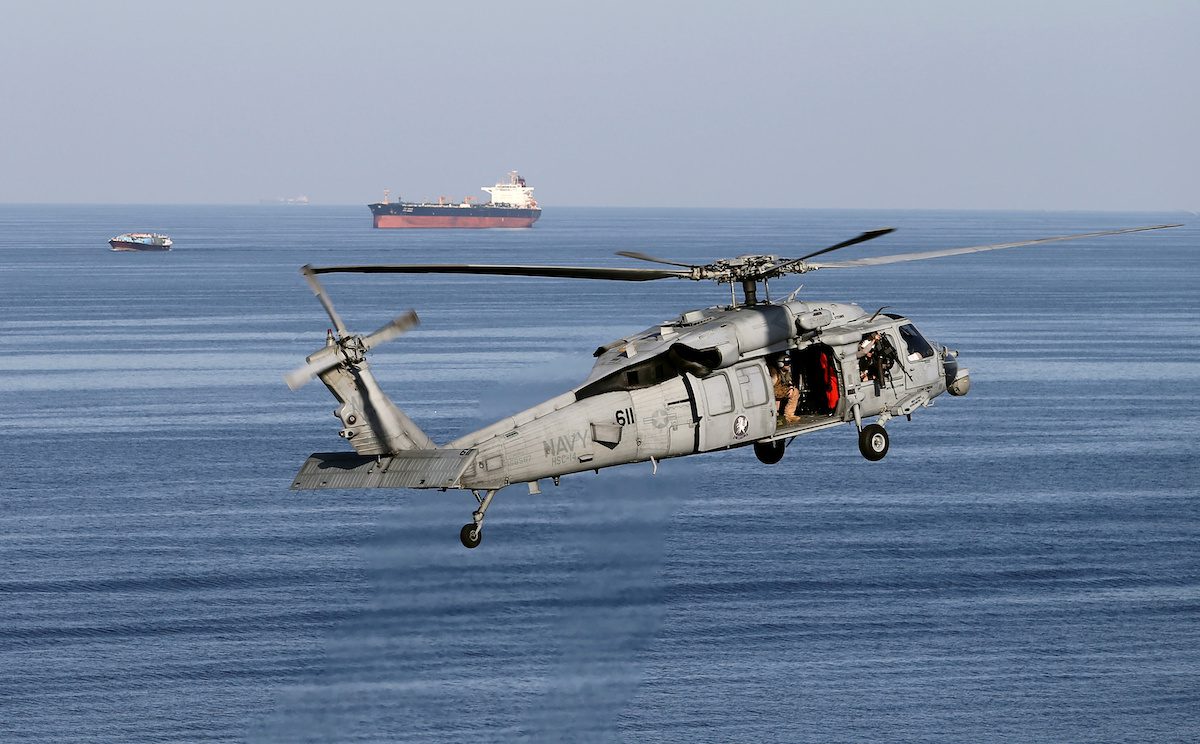FILE PHOTO: An MH-60S helicopter hovers in the air with an oil tanker in the background as the USS John C. Stennis makes its way to the Gulf through the Strait of Hormuz, December 21, 2018. REUTERS/Hamad I Mohammed/File Photo
By Verity Ratcliffe (Bloomberg) –A U.S.-led coalition created to secure sea lines vital to oil shipping in the Middle East formally launched operations in the most concerted international response yet to months of tensions in the region.
Formed in response to a series of attacks on vessels and onshore facilities that some coalition members blamed on Iran, the International Maritime Security Construct (IMSC), formerly known as Operation Sentinel, will protect ships transiting the Persian Gulf, Gulf of Oman and Bab el-Mandeb.
One-third of the world’s seaborne crude and fuels passes from the Persian Gulf through the narrow Strait of Hormuz and into the Gulf of Oman on its journey to international markets. The Bab el-Mandeb is a bottleneck at the southern tip of the Red Sea for ships sailing to and from the Suez Canal.
“Over the last six months, we have seen increased threats in these waters,” said U.S. Vice Admiral James Malloy, commander of America’s Fifth Fleet, based in Bahrain. The naval force will only attack if attacked, he said Thursday at a ceremony in Bahrain.
Large naval vessels, such as frigates and destroyers, will guard critical chokepoints and smaller vessels will patrol the seas, according to a statement from the U.S. Navy. Airborne surveillance will monitor the flow of traffic through “high risk areas,” it said.
The U.S. announced plans for Operation Sentinel in July after Iran shot down one of its surveillance drones the previous month. Washington and Tehran disagreed over whether it was flying over international or Iranian territory at the time.
The U.K. joined the coalition in August, snubbing a European-led initiative favored by Prime Minister Boris Johnson’s predecessor. European leaders have steered clear of IMSC, citing President Donald Trump’s decision to withdraw from the 2015 agreement with Iran to limit its nuclear program as the cause of rising tensions.
Bahrain, which hosts a large U.S. naval base, and Australia became members of the task force in August. Saudi Arabia joined five days after half of its oil production capacity was temporarily paralyzed by aerial attacks on Sept. 14. Yemen’s Iran-based Houthis claimed responsibility but the U.S. and Saudi Arabia said Iran was behind the assault.
The incident followed attacks on several oil tankers in the Persian Gulf and Gulf of Oman in May, including two Saudi vessels. The United Arab Emirates, Saudi Arabia’s partner in the war against the Houthi movement, joined the task force in September. IMSC’s newest member, Albania, joined on Friday. Unlike most of the member nations, which are contributing vessels, Albania is only providing personnel, according to U.K. Royal Navy Commander Ben Keith, the force’s head of operations.
“IMSC is about bringing anybody who can contribute anything to the party,” Keith said. “There are countries more able to provide high-end capability such as a destroyer, aircraft, but we will take whatever you can provide into IMSC to keep people safe.”
© 2019 Bloomberg L.P

 Join The Club
Join The Club











